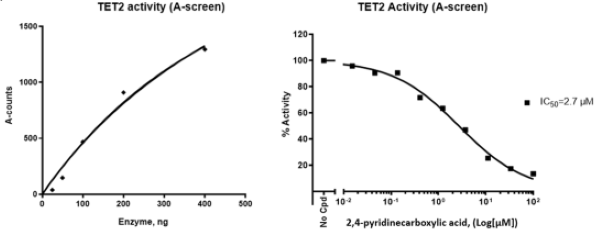TET2 Homogeneous Assay Kit
The TET2 (Tet Methylcytosine dioxygenase 2) Homogeneous Assay Kit is designed to measure the activity of TET2 for screening and profiling applications. The TET2 Homogeneous Assay Kit comes in a convenient AlphaLISA® format, with enough biotinylated TET2 substrate, TET2 assay buffer, and purified TET2 for 384 reactions.
The key to the TET2 Homogeneous Assay Kit is a highly specific antibody that recognizes the hydroxymethylated substrate, and the increase in Alpha-counts is proportional to the hydroxymethylation of the substrate. First, a sample containing TET2 enzyme is incubated with the reaction mixture. Next, acceptor beads are added, followed by donor beads and reading the Alpha-counts.
Need us to run inhibitor screens or profile your compounds against TET2? Check out our Demethylase Screening Services.
- AlphaLISA® anti-rabbit IgG acceptor beads (Perkin Elmer #AL104C)
- AlphaScreen® Streptavidin-conjugated donor beads (Perkin Elmer #6760002S)
- Optiplate-384 (Perkin Elmer #6007290)
- AlphaScreen® microplate reader
| Catalog # | Name | Amount | Storage |
| 50162 | TET2, FLAG-Tag, His-Tag (catalytic domain) | 3 x 40 µg | -80°C |
| Biotin-labeled TET2 Substrate (4 µM) | 50 µl | -80°C | |
| Primary Antibody 27-2 | 4 µl | -80°C | |
| 4x TET2 Assay Buffer 1 | 3 ml | -80°C | |
| 4x Detection Buffer 1 | 2 x 2 ml | -20°C | |
| Plate sealer | 1 | Room Temp |
TET2 (also known as Tet Methylcytosine dioxygenase 2) belongs to the Ten Eleven Translocation (TET) family of proteins that catalyze 5-methylcytosine oxidation and generate 5-methylcytosine derivatives, including 5-hydroxymethylcytosine. TET2 regulates gene expression levels in cancer and immune cells, being a widely recognized tumor suppressor gene. Both homozygous and heterozygous mutations in TET2 are indicative of hematopoietic malignancies, with nonsense and frameshift mutations associated with poor prognosis. In addition, TET2 is one of the most frequently mutated genes in acute myeloid leukemia (AML). Targeting TET2 as therapeutical approach may be complex, as in many cancer types TET2 is inactivated, however it can still be found in some immune cell types and it can be modulated via proteins that regulate TET2 activity.


